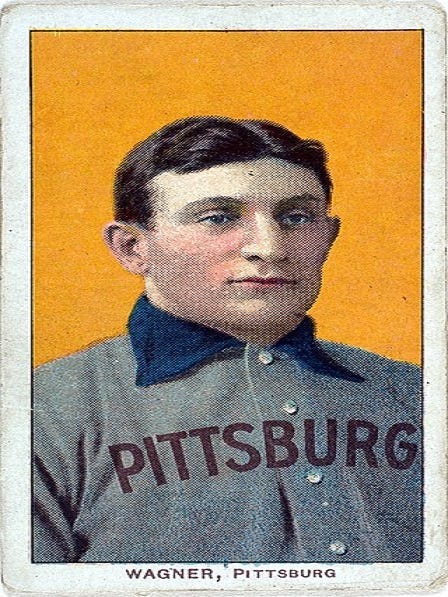A Lesson On Value Greater Than Money Can Buy
A $3 million baseball card teaches us the dual benefit of reputation and being an institution.

Why would a baseball card be worth three million dollars?
You might find yourself stunned by that figure, but now it makes total sense to me.
As a kid I collected baseball and football cards; eventually it wasn’t hard to learn what was valuable. The rarer a card was, the more money it would get you.
All collectors, from kids to professionals, knew one was worth more than all the others: the Honus Wagner baseball card from 1909. It commanded insane dollar amounts even in bad condition.
It was so old; it wasn’t a photograph like on the cards I collected. It was a stylized drawing of the player. There are only about sixty of them in existence as well. Obviously, the rareness equates to the hefty price tag.
However, as I looked into the history of the card and the man, a lesson on value beyond the million-dollar price tag emerged. While most equate value with a dollar amount, the man pictured on the card had a different definition.
Wagner valued his name and reputation, not sacrificing them for any price. While other baseball players around him at the time reveled in the superstar image, he worked to become an institution. Although he’d never put it into those exact words.
This dual lesson is one we should all learn today, especially in an age of quick internet celebrities, self-aggrandizement, and endless ever-present marketing. Wagner became immortal by doing none of these.
Institution Above Superstar
“And it also turned out that while Honus was the best third baseman in the league, he was also the best first baseman, the best second baseman, the best shortstop, and the best outfielder. That was in fielding. And since he led the league in batting eight times between 1900 and 1911, you know that he was the best hitter, too. As well as the best base runner.”
— Tommy Leach, teammate of Wagner, The Glory of Their Times, Lawrence S Ritter
Although most may not be familiar with the name Honus Wagner today, he was the epitome of a superstar in his age. However, he never quite acted like it. Wagner was one of the rare talents who could do everything well.
Wagner played twenty-one seasons for a smaller market team in Pittsburgh and never left, although he could have easily shopped himself around. Furthermore, he won eight straight batting titles — a feat that would only be equaled once. He’d also lead the league in stolen bases five times, earning the title “Flying Dutchman”.
Wagner became one of the first five members of Baseball’s Hall of Fame. Bill James in his book The New Bill James Historical Baseball Abstract named him the best shortstop ever to play the game. He’d also note that when legends Ty Cobb and Babe Ruth picked their own fantasy all-star teams, each selected Wagner.
With ability and talent like this, you’d figure a player would have an ego bigger than a stadium, however, that was never the case. It seems Wagner was the ultimate teammate. As James poetically states:
“Among the great players in the game there are all kinds of men…As gentlemen, there are many who seem worthy of admiration…None seems more worthy than Wagner. He was a gentle, kind man, a storyteller, supportive of rookies, patient with fans, cheerful in hard times, careful of the example that he set for youth, a hard worker, a man who had no enemies and who never forgot his friends. He was the most beloved man in baseball before Ruth. He couldn’t manage, not because he wasn’t intelligent enough, but because he wasn’t hard enough. Those qualities are part of the reason why, acknowledging that there may have been one or two whose talents were greater, there is no one who has ever played this game that I would be more anxious to have on a baseball team.”
Wagner tried to retire in 1908, but the team manager wouldn’t let him, paying him a sum which made it impossible to hang up his glove. He’d go on playing into his mid-forties, even a diminished Wagner was worth having around.
After his playing days were over, the Pittsburgh Pirates still couldn’t let him go. They tried him out as head coach, but it wasn’t a good match. The team kept him around for thirty-nine years, mostly as a batting coach where he helped others develop their swing. A few other hall of famers were students of his.
Superstars often fade away, but institutions are as necessary as the columns holding up a building. While the superstar shines themselves, the institution works to help those around them shine as well.
Reputation Leads To Rareness

Of course I started with the baseball card, so let’s circle back. I mentioned there are only sixty of Wagner’s cards in existence. The reason for this is because he forced the cards to stop being produced. A tobacco company happened to be making them and Wagner thought it would be a bad example for kids to have his face associated with the product.
Many modern news sources skeptically say Wagner stopped the production because he wasn’t compensated enough. However, a newspaper article from 1912 says something much different.
Ralph S. Davis’s article titled “One Player In Game Who Is Not Money Mad” mentions repeated times Wagner passed up easy money to promote products he had no affiliation with. According to Davis, the ballplayer wouldn’t sell his reputation for a quick buck. In fact, the writer mentions how Wagner forgot to cash his last paycheck for that season.
Davis also specifically mentions Wagner declining an invitation to work with the American Tobacco Company (ATC) because he didn’t want his face associated with the product. The ball player even offered a check to compensate the sports reporter who asked, because he felt bad for declining.
Davis paints a picture of a man happy with what he had and wouldn’t lower himself for a few dollars. It would appear fate rewarded Wagner’s decision with value.
Due to Wagner’s stance, less than sixty of the ATC cards are in existence and they command an incredible premium. While other ballplayers of his age put their faces on everything, Wagner was eternally rewarded for having value in himself.
A Never-Ending Lesson
While many won’t know the name Honus Wagner, his lesson on being an institution and valuing your reputation won’t fade any time soon. Every so often, one of sixty baseball cards will go up for sale.
I’m willing to bet the price paid for the cards will rise above the three million dollars mentioned earlier. Likely the astronomical sum will attract attention from the public. It will only lead others to wonder about Honus and why there are only sixty of these cards in existence.
Once again, his story will be told, and new generations will learn his lesson. It’s like fate is rewarding Wagner repeatedly — just as he was rewarded in life for being an institution for his team and community.
Wagner’s dual lesson is one we should think about today as the modern age awards those who scream loudest and shamelessly self-promote. However, eternity appears to reward those who do the opposite.
Value can be found in your own good name and while superstars fade away, institutions carry on their light through the others around them.
-Originally posted on Medium 3/11/21


